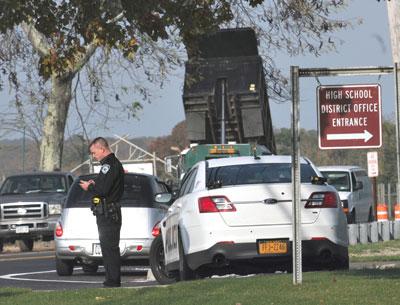For Head Start Kids, a New World at Watermill Center
For Head Start Kids, a New World at Watermill Center

Last week at the Watermill Center, just as dusk approached, a dozen dancers clad in black pants, black turtlenecks, and black socks were warming up, effortlessly moving through various ballet positions, from demi-plié to grand plié and back again.
As they moved, 10 families entered the room with young children in tow, all stunned into silence as classical music by Jordi Saval, a Spanish conductor and composer, played in the background.
“They’re warming up their muscles so we can dance together,” explained Alvaro Restrepo, a Colombian dancer and choreographer, who led his company, El Colegio del Cuerpo, based in Cartagena. “Muy bien. Very good,” said Mr. Restrepo, who spoke in both Spanish and English throughout the afternoon. “That’s how a dancer becomes a dancer, by practicing every single day.”
Since March, a group of 3 and 4-year-olds who attend Bridgehampton Head Start, with their parents, have participated in monthly workshops at the Watermill Center. Free of cost, the aim is for families to create art together and in so doing help to expand the center’s reach far beyond its annual summer gala to a local cultural institution whose doors are open year-round, with private tours offered nearly every Saturday.
Currently, Bridgehampton Head Start provides preschool and early-intervention services to 56 of the South Fork’s neediest families, living from Riverhead to Montauk. Each family lives at or below the federal poverty level, which, for a family of four, translates into a 2014 income of $23,850 a year, according to the U.S. Department of Heath and Human Services.
Carol Burnett, Long Island Head Start’s community outreach and recruitment coordinator, said that among the 22 centers scattered across Long Island, the Watermill family art program is the only known partnership between a cultural institution and a local Head Start program.
Founded by the visual artist Robert Wilson, the Watermill Center opened its doors in 2006. It is housed in what was formerly a Western Union research facility. According to William Wagner, its new managing director, the industrial building was also the birthplace of the fax machine.
Each year 15 artists from a variety of disciplines and backgroundswork in residence. Mr. Wagner sees great value in welcoming working families and their young children; a population, he readily admits, that might not otherwise walk through the center’s (somewhat difficult to find) front entrance.
“We are so excited to be working with these kids and getting them to think in a completely different way,” said Mr. Wagner. “Something that happens here could inspire them to be a performer or a creative artist.”
Though Mr. Restrepo led last week’s workshop, as part of his weeklong residency, the monthly Head Start program is typically run by Andrea Cote, who works as a teaching artist. As soon as she guides a group of young people into the performance hall, she said, she sees their energy expand, their minds bursting with possibilities.
Ms. Cote generally leads the group through 90-minute sessions integrating movement and rhythm exercises, typically involving a craft project and also a tour of the 20,000-square-foot building and six-acre grounds.
Besides Head Start, the Watermill Center runs various educational programs with the Hayground School, the Ross School, Southampton Intermediate School, and the Bridgehampton Child Care and Recreational Center, among others.
Though adults typically attend his workshops, Mr. Restrepo welcomed the opportunity to work with such young children.
“I am more and more interested in working with younger kids,” he said earlier this week. “That’s when the body is more available and awake and ready to absorb all kids of things. There aren’t fears of being ridiculous. There’s no judgment.”
Last week, he gathered participants in a circle, with everyone first sharing their first names and country of origin. The company’s dancers, mostly in their 20s, are primarily Colombian, with one from Venezuela and another from Texas. Families came from Ecuador, El Salvador, Brazil, Mexico, and Romania.
“The children are getting something out of it, but their parents and families are getting even more. Their creativity is being sparked, too,” said Ms. Burnett. Though each workshop is capped at 10 families, with siblings and extended family members welcome, Ms. Burnett sees the program in particular demand during the winter months, as seasonal work dries up and free time becomes more plentiful.
“It’s magical,” said Ms. Burnett. “It’s the first time many of these parents and their children have ever stepped foot into a museum. It’s exposing them to something that’s so foreign. These are families that are trying to get through the day and get food on the table and make rent. When do our families have time to do art as a family?”
Mr. Restrepo led the group through various exercises, with everyone sliding around on the black lacquered floor in either socks or bare feet. Two dancers stood at the center of the room, one acting as the “sculptor,” the other designated as a piece of clay, being manipulated in various shapes and positions.
Franco, 3, quickly squashed any feelings of self-consciousness and approached the center of the room, his tiny body, clad in a khaki jacket and blue pants, lithe and malleable.
New to Bridgehampton Head Start this fall, Franco initially didn’t speak and had trouble sitting still. But at last month’s mask-making workshop, teachers and administrators saw a side of the child not evident in the classroom. They saw him come to life.
Wendy Soni, his mother, who is originally from Mexico and now lives in Hampton Bays, works as a personal trainer at Southampton Gym. “He’s come into himself,” she said, proudly watching her son in command of an entire room. “He’s going to be a dancer.”
Daphne Gil, the center manager, watched Franco with tears in her eyes.
Later on, as Ms. Soni worked with a dancer during another partner exercise, Franco approached his mother, again in search of the spotlight.
“You watch, Franco,” said Mr. Restrepo with a laugh. “You cannot always be the star.”

